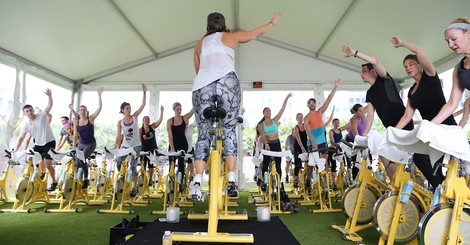Your podcast discovery platform
Curious minds select the most fascinating podcasts from around the world. Discover hand-piqd audio recommendations on your favorite topics.

piqer for: Health and Sanity Global finds
I was born in 1987 in Bucharest. I studied Psychology and Educational Sciences at the University of Bucharest. For two years I worked in a psychotherapy practice, dealing with gambling addicts. I'm an independent reporter, writing and doing video reportages mostly about social and political issues. I am currently based in Jena.
The Gym-As-Church Craze
Upon reading the lead paragraph of this article, that goes “Gyms provide ritual and community, serving as a sort of religion. They also promote values American culture already worships—capitalism and overwork”, I take a look around me. From my position at the kitchen window I can see the snowflakes quietly falling outside, and inside my neighbours’ apartments across the street, all decorated for Christmas. At the kitchen table is my boyfriend, with one tense eye watching a football game and with the other checking the oven, where he’s preparing game. I feel a sudden joy that I wasn’t born American. But it's short-lived, because the gym-as-church craze is far from being limited to within the borders of this country.
People are turning away from traditional religion and religious rituals, but still need the human connection, the routine, the predictability of an encounter that a community provides. Gyms offer just that. They also promote the idea of using your body as a vehicle to attain spiritual health. If religious people fast, kneel and cross themselves, then gym lovers exhaust their bodies and turn off their minds through grueling exercise. “In this way, exercise routines can be a relatively straightforward path to something that resembles a religious ecstatic state.”
“The explicit promise that exercise has a spiritual component seems to elevate it to a higher purpose: Instead of focusing solely on the health and attractiveness of the body, it suggests that fitness is a gateway to a much larger and more lasting state of happiness and fulfillment, much like religious practice.”
As pointed out in the article, this approach to doing sport and the way gym businesses are marketing themselves, leave out a whole chunk of the population, either too poor to join the rollercoaster of self-improvement, or disabled. Moreover, the very idolization of the never-ending striving for accomplishment goes against the purpose of spiritual and mental peace.
